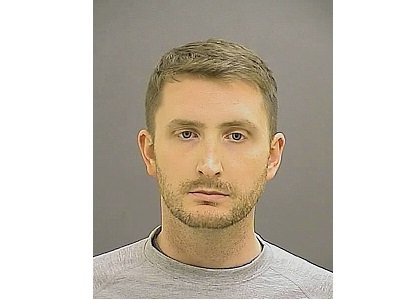BALTIMORE (CNN) — Edward Nero, the second Baltimore police officer to stand trial in the Freddie Gray case, had no hand in taking Gray down to the ground the day he was arrested, a fellow officer and defendant testified Monday.
Nero is charged with second-degree intentional assault, reckless endangerment and two counts of misconduct in office for his actions on April 12, 2015 — the day Gray suffered a fatal spinal injury while in police custody.
Nero is one of six officers charged in connection with Gray’s death. The first trial, of Officer William Porter, ended in a mistrial in December after jurors couldn’t agree on a verdict.
During Nero’s trial Monday, Officer Garrett Miller testified that he detained Gray himself. But according to the prosecution, Miller previously told investigators, “We grabbed him and put him on the ground.”
The defense said Miller used the term “we” because he often talks about himself and Nero as a team. The defense also noted that Miller previously told investigators “I” made the arrest.
The only time Nero touched Gray at the arrest site was when Gray asked for his inhaler, Miller testified. At that point, he said, Nero helped Gray sit up and supported his back to help him stay up.
The state compelled Miller and Porter to testify under immunity in Nero’s trial. That means their testimony cannot be used to incriminate them at their own trials. Porter had not been called as a witness as of Monday afternoon.
Prosecutor: ‘A risky and dangerous position’
Nero was one of three bike officers involved in the initial police encounter with Gray that day in April 2015.
Prosecutor Michael Schatzow told the court that Nero shackled Gray’s legs and, with the help of another officer, loaded Gray into the van.
“Mr. Gray was put in a risky and dangerous position on the floor of that van,” Schatzow said during opening statements.
The prosecution claimed Nero arrested Gray without probable cause and failed to secure the shackled prisoner in the police van.
But during his testimony Monday, Officer Miller said he believed the driver of the van would be the one buckling Gray in.
Expert testimony: Gray suffered diving injury
Also on Monday, a bioengineering expert told the judge that the spinal cord injury that killed Gray would have never happened had he been properly restrained in the back of the police van.
Joseph McGowan testified that Gray’s injury is called a diving injury — one that occurs when the head stops, but the body keeps moving. It’s similar to what happens when people dive head-first into a shallow pool.
McGowan said the injury could have happened in one of two ways: Gray could have slid forward on the floor and slammed his head into the front of the van, or he could have stood up, lost his balance, and fallen head first into the van.
“Had Mr. Gray been restrained by one of the seat belts available in the van, there is no diving injury because there is no mechanics for the diving injury,” he said.
Defense: It was ‘impossible’ to seat belt Gray
Marc Zayon, Nero’s attorney, portrayed his client as a man devoted to public service, including stints as an EMT and volunteer firefighter. As a cop, Nero had no internal-affairs complaints, according to Zayon.
The defense said the chase and arrests were legal.
“Everything that was done in this chase was done correctly,” Zayon said.
An officer’s safety is essential when securing prisoners in the van, Zayon told the court. It was “impossible” for officers to seat belt Gray because the shackled prisoner was resisting.
At one point, when the van stopped and the police went outside to do paperwork, Gray was rocking the van, Miller testified Monday. He said he knew this because he was trying to fill out paperwork against the side of the van.
Prosecutors have said that Gray complained of having trouble breathing and asked for medical help as he was driven in the van. When he arrived at a police substation, he was unconscious.
A week later, Gray died at a hospital from his spinal injury.
Four officers have yet to stand trial — Miller, Lt. Brian Rice, Sgt. Alicia White and Officer Caesar Goodson Jr.
Unlike the first trial against Porter, the latest proceeding is a bench trial at Nero’s request. That means Circuit Judge Barry Williams will decide whether Nero is guilty or not.
CNN’s Ray Sanchez contributed to this report.
